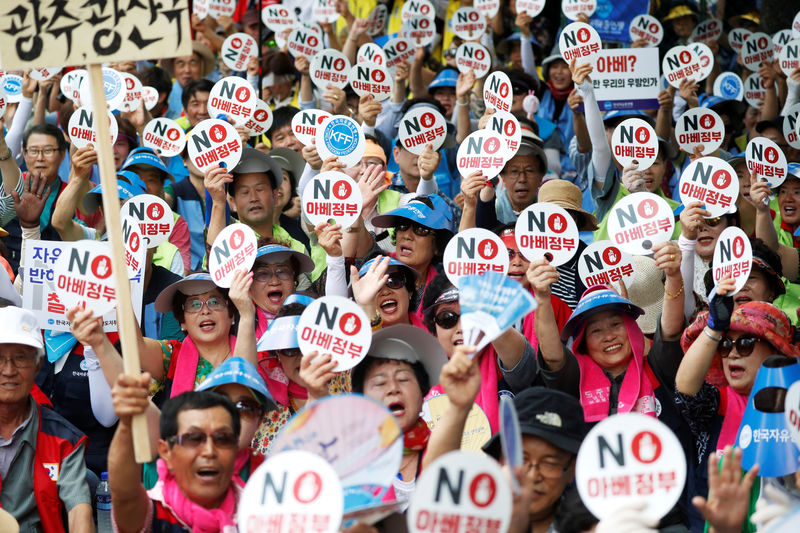By Joyce Lee
SEOUL (Reuters) - Thousands of South Koreans protested outside Japan's embassy in Seoul on Wednesday and city officials unveiled a new memorial to wartime 'comfort women' at the centre of a row over the two countries' shared history.
The day of remembrance for women forced to work in Japan's wartime military brothels comes amid renewed tensions over political and economic disputes dating back to Japan's colonial occupation of the Korea peninsula from 1910-1945.
"Today is particularly meaningful," said Choi Kyun-kee, a leader of the embassy protest that organisers said drew as many as 20,000 people. Police did not confirm the estimate.
Tokyo issued a travel advisory to its citizens warning of demonstrations in the South Korean capital, where protests are planned on Thursday to mark the country's independence from Japan.
Ties between the two U.S. allies have worsened since South Korea's Supreme Court last year ordered Japanese companies to compensate some wartime forced labourers.
Japan says the matter of compensation for 'comfort women' was settled under a 1965 treaty establishing diplomatic ties. Under a 2015 deal, Japan apologised and gave 1 billion yen (7.8 million pounds) to a fund to help the women.
South Korea disbanded the fund last year, saying it was flawed, and announced that Aug. 14 would be a "Memorial Day for Japanese Forces' Comfort Women Victims."
Outside Japan's embassy, protesters demanded Tokyo lift restrictions on exports of certain high-tech materials to South Korea, which Seoul sees as retaliation over the wartime labour dispute. Japan cited security reasons for the curbs.
"We've asked Japan for an apology for a long time, but they're still not owning up to the past," said Noh Min-ock, a 19-year-old student who joined others shouting slogans and waving flags outside the embassy.
"They are instead retaliating - engaging in economic retaliation, which makes me really angry," she added.
In another part of Seoul, city officials unveiled a new statue donated by a group of Korean Americans to commemorate the women forced to work in Japanese military brothels.
Estimates vary widely, but historians say thousands of women, many of them South Korean, may have been involved. There are currently 20 surviving "comfort women" registered with the South Korean government.
Kim Jeong-ju, 88, said she was 13 when forced to work 10-hour shifts at a shipyard owned by Japanese engineering firm Nachi-Fujikoshi, with no compensation and barely any food.
"I was so hungry that I had to eat grass and my hair fell out," a tearful Kim told reporters in Seoul.
After nearly a decade of legal disputes, a South Korean court this year ordered Nachi-Fujikoshi to compensate the women for their forced labour. The company had said during the case that compensation was settled by the 1965 treaty.
Kim said she also wants an apology from Japan's Prime Minister Shinzo Abe.

"I lived like a slave there, but Abe is acting like he didn't know," she said. "I am angry and this isn't fair. I want an apology and compensation."